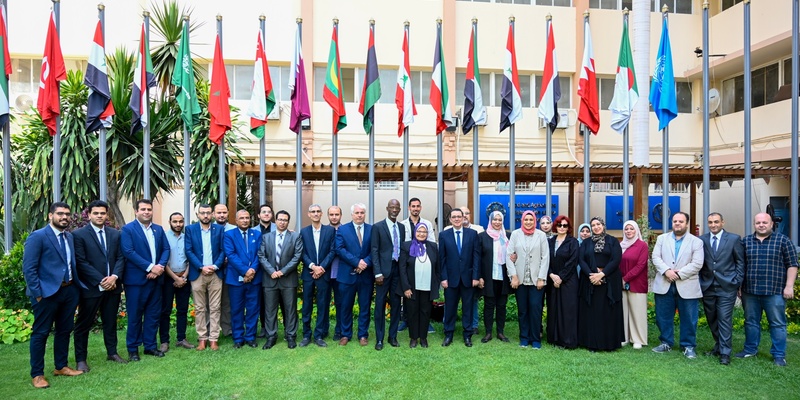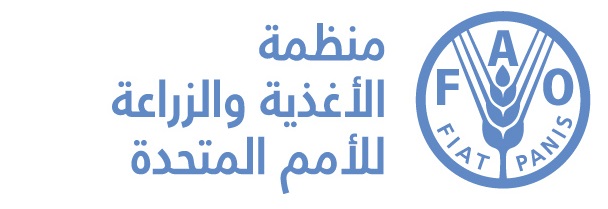Phytosanitary Capacity Evaluation to strengthen Egypt's food security and agricultural trade
Posted on ثلاثاء, 30 إبريل 2024, 09:57

Representatives from the Central Administration of Plant Quarantine, FAO Egypt, IPPC Secretariat and national stakeholders pose after the launch of the Phytosanitary Capacity Evaluation in Egypt. ©FAOEgypt
Cairo, 29 April 2024 – To enhance agricultural production, food safety and national phytosanitary capacity to prevent the introduction and spread of plant pests and diseases, Egypt is embarking on a Phytosanitary Capacity Evaluation (PCE) with the goal to evaluate and strengthen its phytosanitary systems.
The PCE in Egypt is being conducted under the framework of the project “Strengthening Food Control and Phytosanitary Capacities and Governance”, financed by the European Commission and co-implemented by the Agrifood Systems and Food Safety division of the Food and Agriculture Organization of the United Nations (FAO) and the International Plant Protection Convention (IPPC) Secretariat. The PCE in Egypt therefore follows the successful validation of PCEs in nine Common Market for Eastern and Southern Africa (COMESA) countries throughout 2023. In alignment with the African Union's Sanitary and Phytosanitary (SPS) Policy Framework, the project aims to strengthen Egypt's phytosanitary system.
The objective of the PCE is to bring together key stakeholders from the Ministry of Agriculture and Land Reclamation, research institutions and universities, the customs, and the private sector, to take part in the PCE analysis and discussions aimed at improving technical capabilities, governance and strategic planning for plant health in Egypt.
“I congratulate Egypt for deciding to take this critical step to strengthen its phytosanitary capacity and demonstrate its commitment to protecting plant resources from pests”, said Osama El-Lissy, IPPC Secretary, in a message read on his behalf by Fitzroy White – Phytosanitary Specialist at the IPPC Secretariat.
Through this nationwide commitment to agricultural safety and quality, it is expected that stakeholders will support Egypt’s national plant protection organization (NPPO)- the Central Administration of Plant Quarantine (CAPQ), in facilitating the identification of gaps and weaknesses and the development of a workplan and national strategies to advance plant health and enhance Egypt’s phytosanitary system. The PCE will enable Egypt to assess the suitability of its national phytosanitary systems, including laboratories, quarantine centers, and data storage systems, to meet global phytosanitary requirements.
“Agriculture is a cornerstone of the Egyptian economy and wealth. We export over 7 million tonnes of agricultural commodities while importing around 26 metric million tonnes. This requires great attention to our control systems and to make sure of their validity, sustainability, and compliance with our trading countries”, said Saad Moussa, Supervisor of the CAPQ. He was represented by Nader Badry, also from CAPQ.
“Our commitment to safeguarding plant health and national agricultural wealth remains unwavering. I am enthusiastic that the Phytosanitary Capacity Evaluation instrument would guide us to address critical gaps and resolve this through the utilization of strategic planning tools”, he added.
The PCE kicked off with a Situation Analysis workshop on 28 April 2024, to identify gaps in the current phytosanitary system and propose solutions to plug them. This initial phase lays the groundwork for subsequent strategic planning and validation efforts, culminating in a robust national phytosanitary capacity development strategy.
Egypt will focus on areas crucial for its agricultural advancement and intends to enhance export opportunities while safeguarding national biodiversity. Selected thematic areas include review of the national phytosanitary legislation, NPPO organizational structuring, and pest surveillance capabilities.
Lotfi Allal, Officer in Charge of the FAO Representation in Egypt, expressed FAO Egypt’s support to the process.
Results from the PCE, which last up to five years, are expected to enhance plant health, reinforce food security, promote safe trade practices and foster sustainable agricultural transformation in the region.

